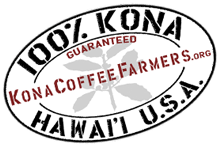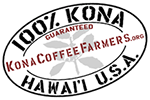by Chelsea Jensen
West Hawaii Today
cjensen@westhawaiitoday.com
Wednesday, March 10, 2010 6:50 AM HST
Reacting to a study saying Kona coffee farmers lose $14.4 million to blenders each year, some processors and sellers claim changing state law to ban the practice of blending Kona coffee or require more Kona coffee in blends would negatively impact farmers, jobs and profits.
Tom Greenwell, Hawaii Coffee Association president, claims Marvin Feldman’s February 2010 study, “Economics of the Hawaii Coffee Industry,” that assessed the economic effect 10 percent blended Kona coffee has on the 100 percent Kona coffee market used unsubstantiated and incomplete data to draw its conclusion.
“What they have called facts in this study are not facts, and we need to set the record straight,” Greenwell said, noting Feldman’s assumption that eliminating blenders in the state would increase farmers’
revenues by more than $14 million is wrong because of errors in the amount of Kona coffee cherry bought by blenders, the cost of the cherry and blenders’ profit.
While unwilling to disclose his Hawaii Coffee Co.’s profit data for proprietary reasons, president Jim Wayman said profit margins for his Oahu-based blending company, and likely for blenders statewide,
are much less than Feldman’s study found.
Refuting Feldman’s study finding that blenders earn profits topping $6.50 per pound, Wayman explained his company sells 93 percent of its blended product to wholesalers at less than half the price listed on his company’s online store. Further, the company purchases green coffee, which includes all grades, for about $9 per pound — nearly double the cost listed in the study.
“We’re only making about half as much as he says we’re making off our products, and we’re paying twice as much as he says we are for our product,” Wayman said. “The assumption that I sell all my coffee at an average of $10.49 a pound is almost double what I sell it at to retailers and restaurants.”
Wayman also noted that blenders purchase at least 50 percent of Kona’s crop, not just 10 percent of the crop labeled as prime as the study claimed. Greenwell also said an informal survey he conducted of “some” of the association’s 65 members showed at least 50 percent of the Kona crop is purchased by processors and blenders.
Shawn Steiman, who holds a doctorate in Tropical Plant and Soil Sciences from the University of Hawaii,
said no more than 300 of the state Department of Agriculture’s 700 registered Kona coffee farms grow, process and sell their coffee, leaving at least 400 farmers who sell most or all of their crop to processors and blenders.
“If you eliminate blending, as much as half of the Kona coffee crop would come back onto the market as green coffee,” Wayman said. “The price paid to farmers for coffee would plummet. … Who would buy all of that coffee? Of course, if you’re sitting there with your coffee rotting there is some price at which a farmer will sell it.”
The excess coffee not purchased by blenders would have to find a market or prices would fall as supply would top demand. The impact, Greenwell claimed, could be similar to 1998 when lawsuits and overproduction caused cherry prices to fall from $1.70 per pound to about 50 cents a pound.
“If we stopped blending then a lot of cherry farmers would have to find other means of income,” Steiman said. “You have to think, now, how many of these people depend on this for living? Could they survive happily?”
Wayman added that without earning a profit, his company would likely not be able to keep its 125 employees.”How many of them will I have to lay off if it changes?” he said, in response to what might happen if the state’s minimum requirement was increased from 10 percent to 51 percent.
Wayman is not against a change in the minimum requirement, but said before any changes are made an independent economic study needs to determine the correct blending percentage that would ensure the survival of farmers and blenders.
“Would any major industry in this country double the price of their product without first doing a thorough market study? The answer is, of course, no,” he said. “Before we blindly just say ‘let’s double the price of the best-selling Kona coffee products,’ we as an industry should do an adequate, independent and professional market study to determine what that change should be rather than just jump in.

